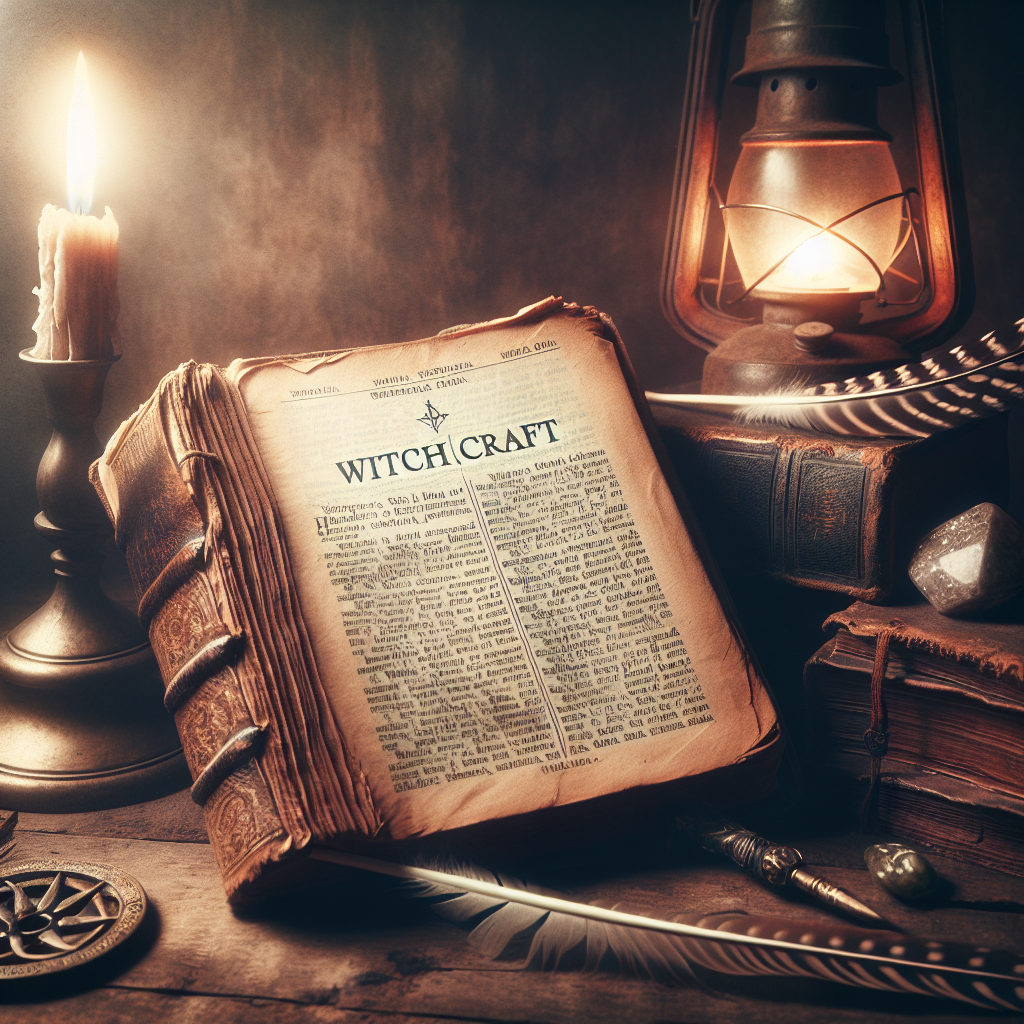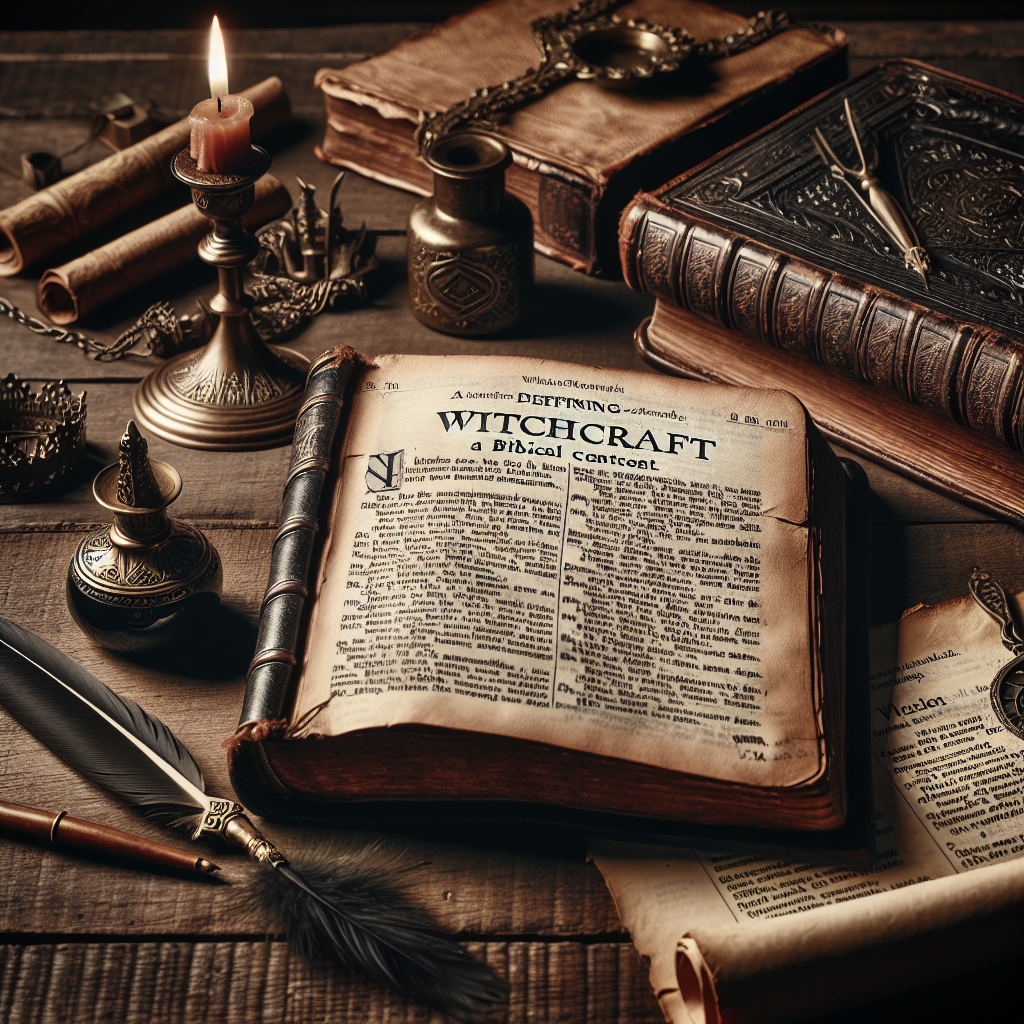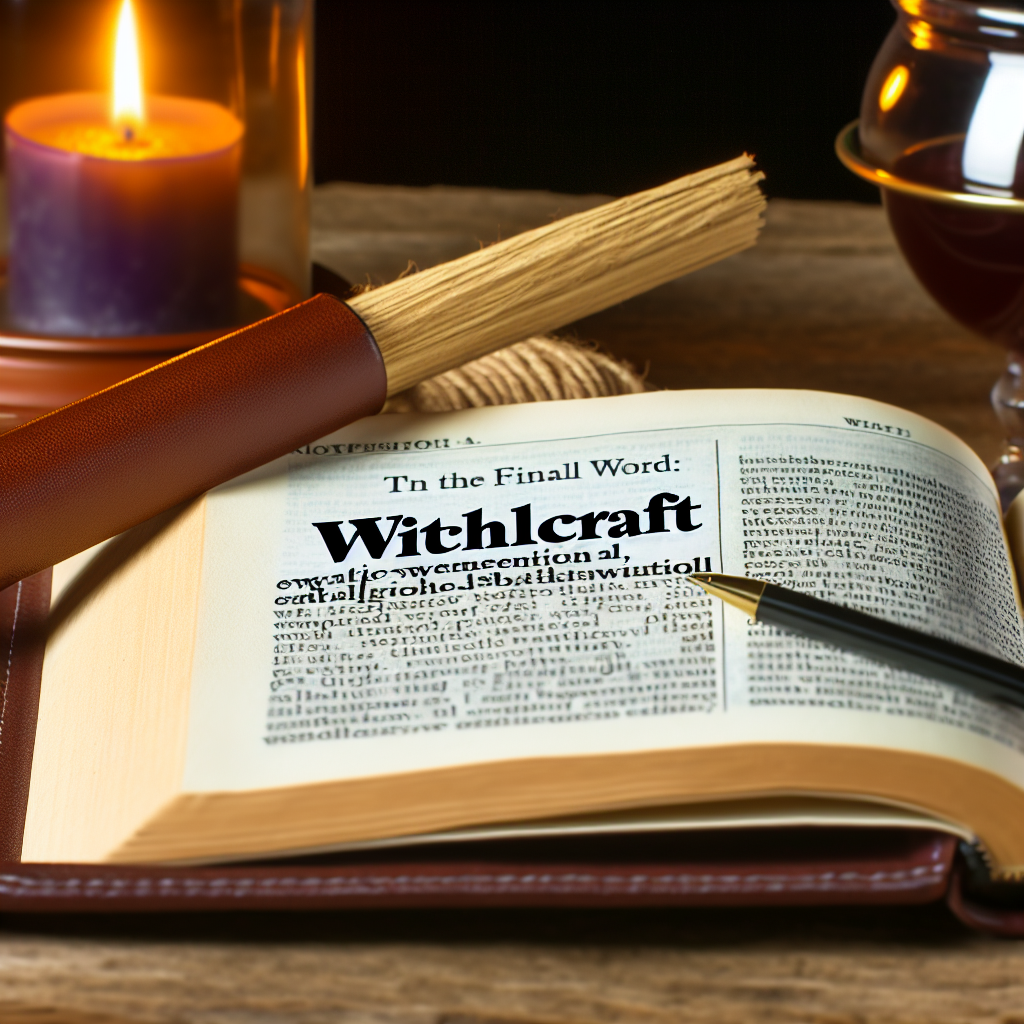As an Amazon Associate I earn from qualifying purchases.

Witchcraft, a controversial practice steeped in ancient lore and mysticism, has long fascinated and intrigued people throughout history. It is a concept deeply ingrained in the human psyche, conjuring images of magic spells, potions, and supernatural powers. However, amidst the various interpretations and cultural perceptions, The Final Word: Witchcraft Definition in the Bible – Exclusive Insights seeks to shed light on the biblical perspective of witchcraft with unparalleled depth and understanding.
Dating back thousands of years, witchcraft has been mentioned and condemned in various religious texts, including the Bible. The term “witch” derives from the Old English word “wicca” or “wicce,” meaning “sorcerer” or “sorceress.” In biblical context, the original Hebrew term “kashaph” is often translated as “witch,” referring to individuals who practice witchcraft or engage in occult activities. The Final Word examines these biblical references and presents exclusive insights on the true definition of witchcraft, clarifying any misconceptions and providing a comprehensive understanding of its implications in religious teachings.
In today's world, where modern witchcraft and paganism are on the rise, the exploration of The Final Word: Witchcraft Definition in the Bible – Exclusive Insights holds significant relevance. With an estimated 1.5 million self-identified witches in the United States alone, this spiritual community continues to grow and diversify. This surge in interest begs the question: how can the Bible's definitive definition of witchcraft guide individuals seeking to navigate a world that increasingly embraces occult practices?
Bringing a fresh perspective to the table, The Final Word delves into various biblical passages that mention witchcraft, unearthing intriguing components that shed light on its nature and consequences. One compelling statistic that arises from these insights is the severity of punishment prescribed for engaging in witchcraft. In the book of Exodus, for instance, it is proclaimed that “You shall not permit a sorceress to live.” This demonstrates the magnitude of the biblical standpoint on witchcraft, presenting society with a thought-provoking dilemma regarding the compatibility of witchcraft with religious doctrine.
To those grappling with questions of faith and seeking a solution within the confines of their religious beliefs, The Final Word: Witchcraft Definition in the Bible – Exclusive Insights offers an opportunity for introspection and understanding. It encourages individuals to critically examine their own spiritual paths and make informed decisions, rooted in the biblical teachings they hold dear.
In a world marked by increasing religious diversity and the exploration of alternative spiritual practices, The Final Word: Witchcraft Definition in the Bible – Exclusive Insights stands as a beacon, guiding believers and seekers alike towards a deeper comprehension of the biblical perspective on witchcraft. It empowers individuals to make personal choices that align with their faith and provides a crucial foundation for theological discussions in our ever-evolving society.
hypertarget{final-word-witchcraft-definition-bible}{}
The Final Word: Witchcraft Definition in the Bible
In this exclusive article, we delve into the topic of witchcraft and its definition as depicted in the Bible. The Bible offers significant insights into various aspects of life, including witchcraft. By exploring the scriptures, we aim to gain an in-depth understanding of what the Bible says about witchcraft and its implications. This article provides an overview of the definitions related to the topic, priming readers for a comprehensive discussion of witchcraft's biblical significance in the next part. Stay tuned for an enlightening analysis of the Bible's perspective on witchcraft.
u003ch2u003eThe Final Word: Witchcraft Definition in the Bible – Exclusive Insightsu003c/h2u003e
u003cpu003eWitchcraft has been a topic of fascination, fear, and controversy throughout history. Even in religious texts like the Bible, witchcraft is addressed and denounced. The definition of witchcraft in the Bible may vary depending on the context, but it is important to explore its roots and implications to gain a deeper understanding.u003c/pu003e
u003ch2u003eThe Historical Context of Witchcraft in the Bibleu003c/h2u003e
u003cpu003eTo comprehend the definition of witchcraft in the Bible, we must first understand the historical context in which it emerged. Witchcraft, or the practice of magic and sorcery, has existed for centuries in various cultures. In biblical times, witchcraft was often associated with paganism and idol worship.u003c/pu003e
u003cpu003eThe Bible, specifically in the Old Testament, frequently condemns witchcraft as an abomination in the eyes of God. In Exodus 22:18, for example, it states, “You shall not permit a sorceress to live.” Leviticus 20:27 also asserts, “A man or a woman who is a medium or a necromancer shall surely be put to death. They shall be stoned with stones; their blood shall be upon them.”u003c/pu003e
u003ch2u003eThe Witch of Endor: A Biblical Illustrationu003c/h2u003e
u003cpu003eOne prominent story in the Bible that highlights witchcraft is the account of the Witch of Endor. In 1 Samuel 28, the witch is summoned by King Saul to communicate with the deceased prophet Samuel. This narrative portrays the practice of witchcraft as forbidden and associated with demonic forces.u003c/pu003e
u003cpu003eThe Witch of Endor's actions were regarded as a direct violation of God's commands, and it ultimately led to Saul's downfall. This story serves as a cautionary tale, reinforcing the Bible's stance on the wickedness and dangers of witchcraft.u003c/pu003e
u003ch2u003eThe New Testament Perspective on Witchcraftu003c/h2u003e
u003cpu003eIn the New Testament, witchcraft is also condemned. Galatians 5:19-21 lists witchcraft as one of the works of the flesh, along with other sins such as sexual immorality and idolatry. The Bible warns believers to stay away from such practices and emphasizes the importance of placing trust in God rather than seeking supernatural power through witchcraft.u003c/pu003e
u003cpu003eIt is crucial to note that the biblical definition of witchcraft is distinct from the popular modern-day perception of witches as primarily innocent or nature-attuned individuals. The Bible portrays witchcraft as a sinful practice that goes against God's will.u003c/pu003e
u003ch2u003eThe Influence of Witchcraft Todayu003c/h2u003e
u003cpu003eDespite the Bible's clear stance against witchcraft, the influence of witchcraft can still be observed in different forms today. While some individuals identify as witches and practice various forms of modern witchcraft, others incorporate elements of witchcraft into their spiritual or cultural beliefs.u003c/pu003e
u003cpu003eAccording to a recent survey, approximately 1.5 million Americans identify as Wiccans, which is a modern pagan, witchcraft-inspired religious movement. This statistic demonstrates that the influence of witchcraft, though not always in line with the biblical definition, continues to have a place in contemporary society.u003c/pu003e
FAQs about Witchcraft Definition in the Bible
-
What is witchcraft according to the Bible?
Witchcraft, as defined in the Bible, refers to the practice of sorcery, divination, or the use of supernatural powers for evil purposes. It is condemned in various passages throughout both the Old and New Testaments.
-
Are there specific Bible verses that mention witchcraft?
Yes, the Bible contains several verses that mention witchcraft. Some notable ones include Exodus 22:18, Leviticus 19:31, Deuteronomy 18:10-12, Galatians 5:19-21, and Revelation 21:8. These verses warn against engaging in witchcraft and associate it with wickedness or idolatry.
-
Does the Bible differentiate between witchcraft and other forms of magic?
Yes, the Bible makes a distinction between witchcraft and other forms of magic, such as miracles performed by prophets or by God Himself. Witchcraft is specifically condemned because it involves seeking power and knowledge from supernatural sources other than God.
-
What are the consequences of practicing witchcraft according to the Bible?
According to the Bible, practicing witchcraft is viewed as a serious sin. The consequences may include spiritual separation from God, divine punishment, and eternal damnation. Individuals who engage in witchcraft are urged to repent and turn away from such practices.
-
Is the definition of witchcraft in the Bible still relevant today?
Yes, the definition of witchcraft as described in the Bible is still relevant today. Though cultural practices and beliefs may vary, the underlying message of witchcraft being an abomination to God remains consistent throughout Christian teachings.
-
Does the Bible provide any guidance for dealing with witchcraft?
Yes, the Bible offers guidance on how to deal with witchcraft. It encourages believers to avoid any involvement in witchcraft, to stay away from those who practice it, and to seek spiritual protection through prayer and reliance on God's power.
-
Can a person be forgiven if they have practiced witchcraft in the past?
Yes, the Bible teaches that forgiveness is available for all sins, including the practice of witchcraft, through sincere repentance and faith in Jesus Christ. God's grace is sufficient to forgive and cleanse anyone who genuinely turns away from their past sins.
-
Are there any instances of witchcraft being practiced positively in the Bible?
No, the Bible does not endorse or portray witchcraft as a positive practice. It consistently condemns witchcraft as an act of rebellion against God's authority and an alliance with demonic forces.
-
Do all Christians interpret the Bible's stance on witchcraft the same way?
No, there may be variations in interpretations among Christians regarding the Bible's stance on witchcraft. While most Christian denominations and traditions strongly discourage any involvement in witchcraft, nuances in interpretation and emphasis on different biblical passages may lead to some differences in opinion.
-
Is there any historical context to consider when understanding witchcraft in the Bible?
Yes, understanding the historical context is important when interpreting references to witchcraft in the Bible. Ancient Israel, for example, was surrounded by cultures where witchcraft and idolatry were common. Thus, the biblical warnings against witchcraft served as a necessary cautionary measure for the Israelites to maintain their faith and avoid falling into idol worship.

Conclusion
In this thought-provoking article, we delved into the definition of witchcraft in the Bible and gained exclusive insights into its historical and cultural context. We discovered that witchcraft is viewed as a form of rebellion against God's authority and a violation of his commandments. The Bible clearly condemns witchcraft, labeling it as an abomination and sternly warning its followers to stay away from such practices.
Moreover, we explored the various interpretations of witchcraft in different biblical passages. While some argue that witchcraft refers to the manipulation of supernatural forces for evil purposes, others contend that it encompasses a broader range of occult practices. Despite these different interpretations, one common theme prevails: that witchcraft involves seeking power and knowledge outside of God's realm, which is deemed sinful and forbidden according to biblical teachings.
Furthermore, we examined the consequences of involving oneself in witchcraft, ranging from physical punishment to eternal damnation. The Bible underscores the severity of engaging in sorcery or seeking the help of witches, often prescribing death as the penalty for such actions. Additionally, we explored the dilemma faced by modern-day Christians in differentiating between witchcraft and legitimate practices, such as herbology or healing. It highlights the need for discernment and a deep understanding of biblical principles to navigate these complexities.
Overall, this article has provided us with exceptional insights into the biblical definition of witchcraft. It serves as a reminder for believers to remain steadfast in their faith and avoid any involvement in occult practices that may lead them astray from God's path. With a comprehensive understanding of these biblical teachings, individuals are better equipped to make informed decisions and cultivate a closer relationship with their Creator.
Amazon and the Amazon logo are trademarks of Amazon.com, Inc, or its affiliates.


